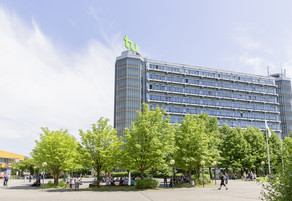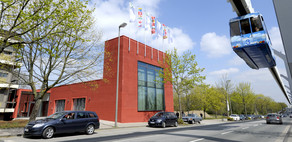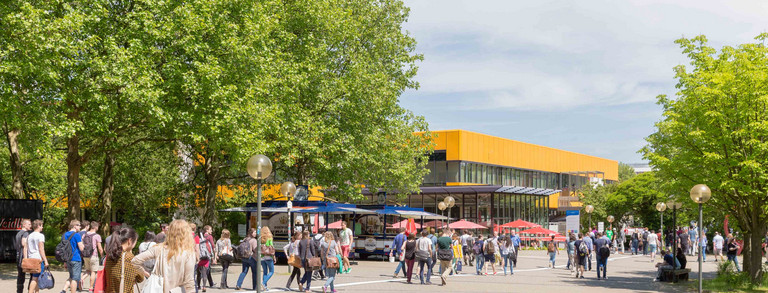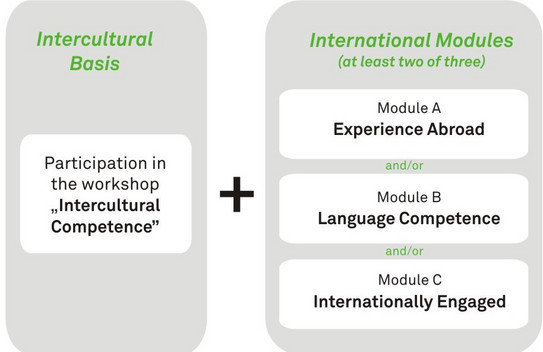In brief: The structure of the “Studium International” certificate has changed somewhat, but there are transitional solutions to make it fair for all students.
Please note: The structure of the “Studium International” certificate described below will apply from 1.1.2025. All students who took part in an intercultural training course before 1.1.25 or were in contact with Ms. Pehle to arrange their activities can choose whether they would like to have the certificate issued according to the “old” rules or the new ones (see below).
Click here for the new structure of the certificate.
Certificate „Studium International“
If you are committed to international activities alongside your studies and work on your relevant skills, for example by attending language courses, completing internships abroad or getting involved in integration projects on campus, you can illustrate this commitment in a bundled form with the certificate "Studium International". This is particularly useful for future job applications.
How is this Certificate Structured?
International activities are manifold - therefore the certificate offers a high degree of flexibility. At the same time, the activities are divided into different modules to ensure comparability.
In order to fulfill the minimum requirements, there is a mandatory component and three modules, two of which must be fulfilled:
Optional components: In general, the certificate is structured in such a way that there are three modules, namely on the topics of experience abroad (module A), foreign language skills (module B) and voluntary work with an international connection (module C). Each module has its own minimum requirements with which one can completely fulfill this module. In order to receive the certificate, at least two of three modules must be fulfilled. Details of the minimum requirements and what can be credited can be found below under "Modules and workshop".
Obligatory component: Participation in a workshop on the topic of "Intercultural Competence" is obligatory for all those who wish to acquire the certificate. The International Office offers such workshops, but you can also get recognition for your participation in a training course of another provider if the content is comparable (please contact Ms. Julia Pehle to inquire about the possibilities of acknowledgement).

„The course concisely and interestingly summarizes the most important stereotypes and cultural theories and gives worth knowing and useful tips for one's own reflection on intercultural competences (translated testimonial)“

„...it was interesting to gain theoretical insights into culture, but also to reflect on aspects that one has already encountered in practice (translated testimonial).“

„Despite the circumstances, it was a great success! The Miro board also worked well and replaced brainstorming with pieces of paper. All in all, a very successful workshop (translated testimonial).“

„There was a good balance between theoretical basics and interactive exercises, so that the terms culture as well as interculturality were defined in a way that I could understand. With many examples, this was also made more transparent and tangible.“
What Is Behind the Modules and the Workshop?
Workshop offered by the International Office
This workshop is aimed at all students interested in intercultural learning. The aim is to learn more about culture and cultural imprints, to reflect on intercultural experience and to develop perspectives for future interactions. The trainings which are offered as an "Intercultural Basis" for the certificate "Studium International" are not country-specific, but deal with cross-cultural content.
Didactically and methodologically, the training is designed in such a way that, in addition to theoretical input, the dynamics of intercultural encounters are illustrated by means of personal experience reports, case studies from everyday study life and simulations.
The workshop language is German. If you are interested in attending an English-taught workshop, please contact Ms. Pehle directly or sign up on this page to get updates on dates for English-taught workshops.
Dates
In 2024, workshops (in German) will be offered by the International Office on
- Friday, 15 November, 2024 (already fully booked)
- Tuesday, 17 December 2024 (already fully booked)
- Tuesday, January 14, 2025 (already fully booked)
- Tuesday, March 18, 2025
- Friday, April 25, 2025
All workshops will take place in presence at the International Meeting Center (IBZ), Emil-Figge-Str. 59 in seminar room 2/3 from 9:30 a.m. to 4 p.m. Click here to register.
External providers of workshops
There are different ways to do such training: e.g. at AIESEC, during the semester abroad, in preparation for voluntary service or cultural exchange, etc. If you would like to have a training/workshop credited for the certificate that was not conducted by the International Office, please contact Julia Pehle.
At TU Dortmund University you have various opportunities to broaden your horizon by spending a semester abroad - be it a semester abroad in Europe with the "ERASMUS" program, at one of our partner universities in America, Africa, Australia or Asia or an internship abroad. You can get all information on our "Outgoing" pages.
- Study stay at a foreign (partner) university: Proof of stay/residence/attendance ("Certificate of Attendance" or "Transcript of Records"); minimum stay: 3 months (12 weeks)
- Internship abroad: proof by an internship certificate; minimum duration: 2 months (8 weeks)
- International students who have come to study at TU Dortmund University from abroad can have this stay credited for Module A (enrollment in a degree program, not as a language student); minimum stay: 3 months
- International doctoral candidates who have come to TU Dortmund University from abroad for research purposes can have this stay credited for Module A (enrollment required; minimum stay: 3 months)
At the Center for Higher Education (zhb), Department of Foreign Languages (formerly: Language Centre) of TU Dortmund University, currently, among other subjects, 13 modern foreign languages are being taught: "The competent command of at least one, or even better two foreign languages is now part of the academic professional profile and thus improves your career opportunities" (www.zhb.tu-dortmund.de/fs). For the certificate "International Studies", language courses that you completed at a foreign university during your stay abroad or language courses offered by providers outside the university (such as the Adult Education Center, Volkshochschule, VHS) are also recognized if the courses were attended during your studies at TU Dortmund University.
- Language courses:
- Proof of participation in a non-native language course (specialist or general language) during the course of study
- At least two 2-hour, i.e. double lesson courses (2 SWS, i.e. 2 weekly hours/semester) in the same language or one 4-hour course (4 SWS). (Example: attendance of the course "Spanish B2 Writing" with 2 SWS, and attendance of the course "Spanish B2 Speaking Skills" with 2 SWS OR attendance of the course "Spanish A2" with 4 SWS). If you are taking courses from other providers, we will count the class hours; with 2 SWS equaling 30 class hours and 4 SWS equaling 60 class hours.
or
- DaF co-teaching activity (i.e. assistant teaching in the subject German as Foreign Language)
- Cooperation in the specialist language courses German as a Foreign Language as a co-teacher (at the Center for Higher Education – Department of Foreign Languages)
- Minimum duration: 2 semesters
This is the most diverse module in which international students can share their experience and culture with German students and act as ambassadors for their own nations and universities. German students can help foreign students in buddy programs and thereby acquire a wide range of international soft skills.
Minimum requirements to fulfil module C
Please prove that you have been committed for at least two semesters. This can be in the same organization or program, or alternatively in two different ones. Track 1 refers to on-campus engagement and Track 2 to off-campus engagement.
To meet the minimum requirements, you can also combine tracks 1 and 2. This would then be on the one hand engagement on campus, for example as a buddy in the Come2Campus programme, and on the other hand engagement off campus, for example in a project organized by the City of Dortmund with an international connection.
Module C - Internationally Engaged | Track 1 - Internationally Engaged on Campus
In Track 1, you can receive credit for voluntary work in a project, with an organisation or at events that helps to shape internationality on TU Dortmund's campus. This includes buddy programmes, cultural events, faculty-specific projects and much more. Here you will find a - non-exhaustive - overview of organisations, events and projects that fit Module C - Track 1:
Active membership in one of the following organizations:
Support and student buddy programs
Active participation in a TU Dortmund buddy program. These are organized both for international students or for exchange students (within the framework of Erasmus or other exchange programs).
- At the beginning of each winter semester, the International Office organizes the "Come2Campus" buddy program for international first-year students as part of the central welcome event.
- At the Institute of American and English Studies of the Faculty of Cultural Studies you can participate in the "Dortmund Doubles" program.
- "Cultural Companions Program": The Coordination of Applied Linguistics and Cultural Studies organizes the Cultural Companions Program every semester. Dortmund students are brought together with ERASMUS students and both sides help each other to better understand life in Dortmund and life abroad.
- To facilitate the start of studies and everyday life in Germany, the Faculty of Mechanical Engineering organizes mentoring programs every semester. Students of the Faculty of Mechanical Engineering from all semesters support international students, especially during their first weeks in Dortmund. All information can be found on the faculty's websites.
- The ERASMUS Buddy Program of the Faculty of Economics and Business Administration also serves the intercultural exchange of students and is intended to make it easier for visiting students from other European countries to start their everyday student life at the TU Dortmund.
- In the Faculty of Architecture and Civil Engineering, the mentoring program for international exchange students was launched. Buddies are supposed to help the international guests to find their way around quickly anyway.
... are you aware of any other buddy programs at TU Dortmund University? This list is not exhaustive and we welcome your feedback!
Participation in events organized by the International Office or the faculties
- Second Monday: How about a game night, barbecue, international cooking together, movie nights, karaoke, carnival, Christmas or Easter parties with German and international students? Internationally active clubs and student councils invite you every second Monday of the month to the Open Afternoon from 6-8 p.m. at the IBZ. International and German students are welcome - as guests and as organizers!
- Sprachcafé/Language Café: Every second Thursday, our Language Café offers international students the opportunity to engage in a joint exchange, to have exciting conversations, and to use or improve their German skills in the process. You can receive a certificate of attendance for regular participation in the Language Caféand active engagement there. Prerequisite: Participation in at least six dates within one semester.
- The Festival of Cultures (formerly International Culture Café (IKC)) takes place every semester. Supported by international students, culinary delights and a program with music, dances and other cultural activities are offered at the event. Sometimes the focus is on a specific country or continent, sometimes cultures from all countries of the world are presented. Participation in two events is counted as a one-semester commitment.
- The International Office organizes various events for which support is needed. You can help to organize these projects and events - for example, country events, presentations at the summer festival, participation in study information days about studying abroad, etc. If you would like to implement your own ideas or find out more about the various activities, please contact our Social Counseling team.
- Please discuss ideas and wishes in advance with the International Office or your contact persons in the faculties.
Faculty-specific projects
- For journalism students: Journalism students can get credit for the commitment in the "Europa Group" for Module C. Here, the work over two semesters is counted as a one-semester commitment.
- Some faculties have their own support programs for international students or other projects and initiatives. If there is such a project at your faculty that appears suitable for this certificate, please do not hesitate to let us know!
Tutoring
You can get credit for your commitment as a tutor at the Center for Higher Education, Department of Foreign Languages. You have the following options:
- Language tutor in the course "Regional Studies" (B2): You can accompany a course on German regional studies (April to July or October to January) and independently organize course units in addition to the teaching observation. In order to receive credit for your commitment to the certificate, two to three dates will need to be (co-)arranged by you. We also happily welcome creative contributions!
- In the German Conversation Courses (B2, C1), your task is to practice the German language in conversation with the language students and deepen existing language skills. In order to receive credit for your commitment to the certificate, you will need to spend about 10 lessons with the language students and write a short report at the end together.
- If you are studying at a faculty of engineering (Faculty of Mechanical Engineering, Biochemical and Chemical Engineering, or Electrical Engineering and Information Technology), you can support the course "Fachsprache Deutsch für Ingenieurwissenschaften B2/C1", either in a similar form to the German conversation courses or by organizing guided tours of experimental laboratories, technical facilities etc.
For all activities, it is important that you contact the zhb as early as possible so that your contribution(s) can be planned and considered. Please contact Dr. Meni Syrou before the beginning of the lecture period.
This is the most diverse module where students from different professional and cultural backgrounds can share their experiences and learn from each other, exchange ideas and build friendships.
Minimum requirements to fulfil Module C:
Please provide evidence that you have been involved for at least two semesters. This can be in the same organisation or programme, or in two different ones. Track 1 refers to on-campus engagement and Track 2 refers to off-campus engagement.
To meet the minimum requirements, you can also combine tracks 1 and 2. This would then be on the one hand engagement on campus, for example as a buddy in the Come2Campus programme, and on the other hand engagement off campus, for example in a project organized by the City of Dortmund with an international connection.
Module C - Track 2 - Internationally Engaged Off-Campus
In Track 2, you can receive credit for voluntary work in a project, with an organisation or at events outside the TU Dortmund (preferably in Dortmund or the surrounding area) that have an international connection.
- The commitment must be carried out while you are enrolled in your subject-related studies at TU Dortmund University. This can also be during a study-related stay abroad such as a semester or internship abroad (not during a holiday). If the purpose of your internship abroad is voluntary work (.e.g. in a refugee project in Greece), you can have this credited either for module A or for module C, not for both modules.
- Duration: one year/ two semesters (also possible: at least 6 months each in two different projects, also in Track 1).
- The commitment must not be a compulsory part of your degree programme (such as in project studies in spatial planning).
What is an "international connection"?
This can be very diverse: Are you involved in a project for refugees? Are you involved in a volunteer project that works to improve drinking water supplies in another country? Are you involved in a project at a school in your host city during your semester abroad? Are you active with ESN Dortmund or abroad and organise projects within the framework of "Social Erasmus" where you contribute off campus?
If you would like to have your involvement credited for Module C - Track 2, please submit proof and complete this attachment describing your involvement.
FAQs
No, it is not. It is therefore not linked to other study achievements and not related to your Bachelor's or Master's degree.
No, a separate registration is not necessary. During your studies at TU Dortmund University, you can collect the according evidence of your activities and then hand in your documents and the form "Overview of Activities" at Ms. Julia Pehle. However, you have to register separately for the Intercultural Training.
Yes, this is absolutely necessary.
No, this is entirely up to you; there is no specific chronological order in which you must perform the various elements. The certificate can be acquired in any number of semesters during the study period by both German and international students.
Please note that anything you have done before or after your studies at TU Dortmund University cannot be credited!
Sorry, this cannot be credited. This is an offer of TU Dortmund University which recognizes commitment in the international field during your studies at TU Dortmund University only.
Yes, in order to fulfill Module C, you must be committed for at least two semesters; in the same organization or program, or in two different ones. This can also happen in the same semester, e.g. you can be involved in Come2Campus as a buddy and also in ESN in the same semester.
In order to obtain the certificate, the minimum requirements should first be met. If you have fulfilled more requirements, you do not need to select and exclude, but all activities can be listed on the certificate - after all, it should reflect the complete variety of your international activities. Therefore, you do not have to choose between either a semester abroad or an internship, but both can be listed.
Sorry, they cannot. In addition to stays abroad and language learning, the certificate is intended above all to promote and honor voluntary work in the international field. Therefore, courses that are an integral part of your studies cannot be credited towards the certificate.
Contact person for all questions concerning the certificate and the intercultural training is Ms. Julia Pehle. The "Studium International" certificate can be obtained at any stage of your studies. However, it is advisable to wait until the end of your studies to make sure that you have no further activities that can be added to the certificate.
You can submit/upload your documents on this page.
After uploading, we will contact you and if everything is complete, we will send you the certificate by post.












